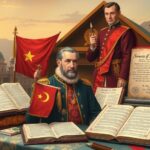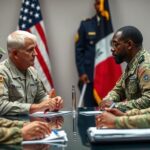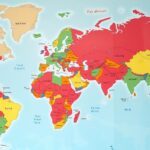Argentina’s War Declaration: A Historical Turning Point in WWII
Eighty years ago, Argentina declared war on the Axis powers, moving from neutrality to engagement in World War II. The declaration, signed by President Edelmiro Farrell, occurred amidst shifting global dynamics. The economic pressures and eventual alignment with other Latin American nations culminated in participation in the San Francisco Conference and the creation of the United Nations. Juan Domingo Perón played a vital role in this policy shift, which remains a topic of discourse regarding Argentina’s wartime legacy.
Eight decades ago, Argentina officially declared war on the Axis powers, a delayed response in the context of World War II. This decision transpired on March 17, 1945, when de facto president Edelmiro Farrell signed the accord at Chapultepec Castle in Mexico City, affirming Argentina’s alignment with twenty Latin American nations and its state of war against Nazi Germany, fascist Italy, and Imperial Japan.
During this period, the United States began to overshadow the United Kingdom politically and economically. Argentina maintained a neutral stance, initially refusing to join the Allies after America’s entry into the war post-Pearl Harbor, primarily due to British pressure that safeguarded Argentine meat exports, vital for the UK’s wartime sustenance.
At a time when twenty nations had disconnected ties with the Axis, Argentina stood alone, reflecting a national sentiment of neutrality. The military coup in 1943 perpetuated a neutral policy until the regime could no longer uphold it. In 1945, under President Pedro Ramírez, formal ties with Axis nations were severed, yet public reluctance remained strong against engagement in the conflict.
The decisive moment arrived when Decree 6945 was issued, officially embedding Argentina into the war and authorizing participation in the San Francisco Conference, which established the United Nations. Despite the prolonged isolation from global alliances and military resources, Argentina’s war effort fostered a burgeoning defense industry under General Manuel Savio.
Significant to this shift was Juan Domingo Perón, who foresaw the post-war landscape. As war minister, he initiated the Consejo Nacional de Posguerra and later facilitated the confiscation of Axis-aligned assets through the Junta de Vigilancia, thereby strengthening Argentina’s economic independence.
Despite the eventual declaration of war, the perception of Argentina’s wartime neutrality persists in historical discourse. Some regard this delay as a missed opportunity, while figures like historian Félix Luna perceive pride in Argentina’s independent stance as a reflection of national growth and resilience, alluding to it as a form of a Creole compromise upheld for nearly five years against global powers.
In conclusion, Argentina’s declaration of war against the Axis powers represented a pivotal change during World War II, albeit a delayed one. Initially adhering to neutrality due to British influence, Argentina eventually recognized the need to align with the Allies. The complexities of this decision—rooted in national pride and economic strategy—showcase the nuanced history of Argentina’s involvement in the global conflict and its consequences on future international relations.
Original Source: www.batimes.com.ar








Post Comment